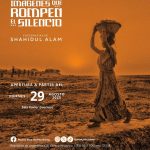Subscribe to ShahidulNews
The mail today brought a copy of ?Amader Kotha?. A publication by the American Center in Dhaka. The lead article in this unsolicited newsletter by Abu Naser was entitled ?An International Election in November: A chance for Bangladesh to learn about democracy?. As I landed at Zia International Airport yesterday, my colleague Tanvir, told me of the gunning down of the opposition MP the day before. At night I stopped the rickshaw to photograph the burning cars in the streets. The violence, the protests, the despair, is all too familiar. We saw it during military rule and during all the subsequent regimes. Abu Naser rightly, points to failures in the democratic process in Bangladesh. But to learn about the democratic process from the US! Perhaps it had to do with Rumsfeld?s claim that their failed cover up of military atrocities was evidence of a healthy democracy. Their previous ?exemplary? election is perhaps better left unmentioned.
I remember the surprise in the media in the UK, aghast at what was being reported from Iraq. It is hardly as if this had not been known before, by anyone who might have cared to listen. I am less surprised, when the confirmed atrocities by US soldiers, is suddenly seen as something done by them out there. No talk of coalition forces this time. No talk of united responsibilities, or united blame. I am not surprised when the assassinations in Palestine resulted in merely the predictable ?condemnation? by the UN and western nations. ?Tut tut, you mustn?t do that you know!?
I see the fire raging around me and throughout the globe and remember Mahmoud Darwish?s anger.
Shahidul Alam
Dhaka. May 10th 2004
Identity Card
Write down!
I am an Arab
And my identity card number is fifty thousand
I have eight children
And the ninth will come after a summer
Will you be angry?
Write down!
I am an Arab
Employed with fellow workers at a quarry
I have eight children
I get them bread
Garments and books
from the rocks..
I do not supplicate charity at your doors
Nor do I belittle myself at the footsteps of your chamber
So will you be angry?
Write down!
I am an Arab
I have a name without a title
Patient in a country
Where people are enraged
My roots
Were entrenched before the birth of time
And before the opening of the eras
Before the pines, and the olive trees
And before the grass grew
My father.. descends from the family of the plow
Not from a privileged class
And my grandfather..was a farmer
Neither well-bred, nor well-born!
Teaches me the pride of the sun
Before teaching me how to read
And my house is like a watchman’s hut
Made of branches and cane
Are you satisfied with my status?
I have a name without a title!
Write down!
I am an Arab
You have stolen the orchards of my ancestors
And the land which I cultivated
Along with my children
And you left nothing for us
Except for these rocks..
So will the State take them
As it has been said?!
Therefore!
Write down on the top of the first page:
I do not hate poeple
Nor do I encroach
But if I become hungry
The usurper’s flesh will be my food
Beware..
Beware..
Of my hunger
And my anger!
An extract from the text of the Berlin Festival Appeal:
“Mahmoud Darwish was one of the best-loved Arab poets of modern times and counts among the most eminent poets in the history of world literature. Thousands flocked to hear his readings, and his volumes of poetry have been published in the hundreds and thousands. Numerous pieces have been translated into more than 30 different languages. His poems have been transformed into folksongs and many of his verses have taken on the character of proverbs.
Darwish‘s poetry draws inspiration from the tradition of ancient Arab poetry and Modernist influences and borrows from the style and language of both the Qur’an and the Bible. Few other poets have displayed such dedication to articulating a vision of a meaningful, real and fair peace between Arabs and Israelis, which furthers a dialogue between two voices and two different outlooks on life, while ensuring that one does not impose its view upon the other.
In the tradition of ancient Arab poetry, the poet assumes the role of spokesperson for his people. And despite Darwish‘s move away from this role since the 1990s, many readers still viewed him as Palestine’s literary ambassador to the last.
Mahmoud Darwish was born in 1941 in the village of Al-Birweh near Acre. In 1948, he fled to Lebanon and returned after the foundation of the state of Israel. He worked as an editor for various political and cultural journals in Haifa. After being imprisoned on numerous occasions, he left Israel in 1970 and went into exile. He has lived in Moscow, Cairo, Beirut, Paris and, most recently, in Amman and Ramallah. In 1987, he was elected to the executive committee of the Palestine Liberation Organization and helped draft the Palestinian Declaration of Independence in 1988. He left the organization in 1993 in protest against the signing of the Oslo Accords. He received numerous awards, including the Lannan Prize for Cultural Freedom in 2001 and the Erich Maria Remarque Peace Prize in 2003.
Darwish died on 9 August 2008 following heart surgery. He was buried in the West Bank city of Ramallah and granted a state funeral.”
—
Gallerie Publishers
208 Om Chambers
Kemps Corner
Mumbai 400036
India
————————————————————————————
Mahmoud Darwish 1942 – 2008





Leave a Reply
You must be logged in to post a comment.